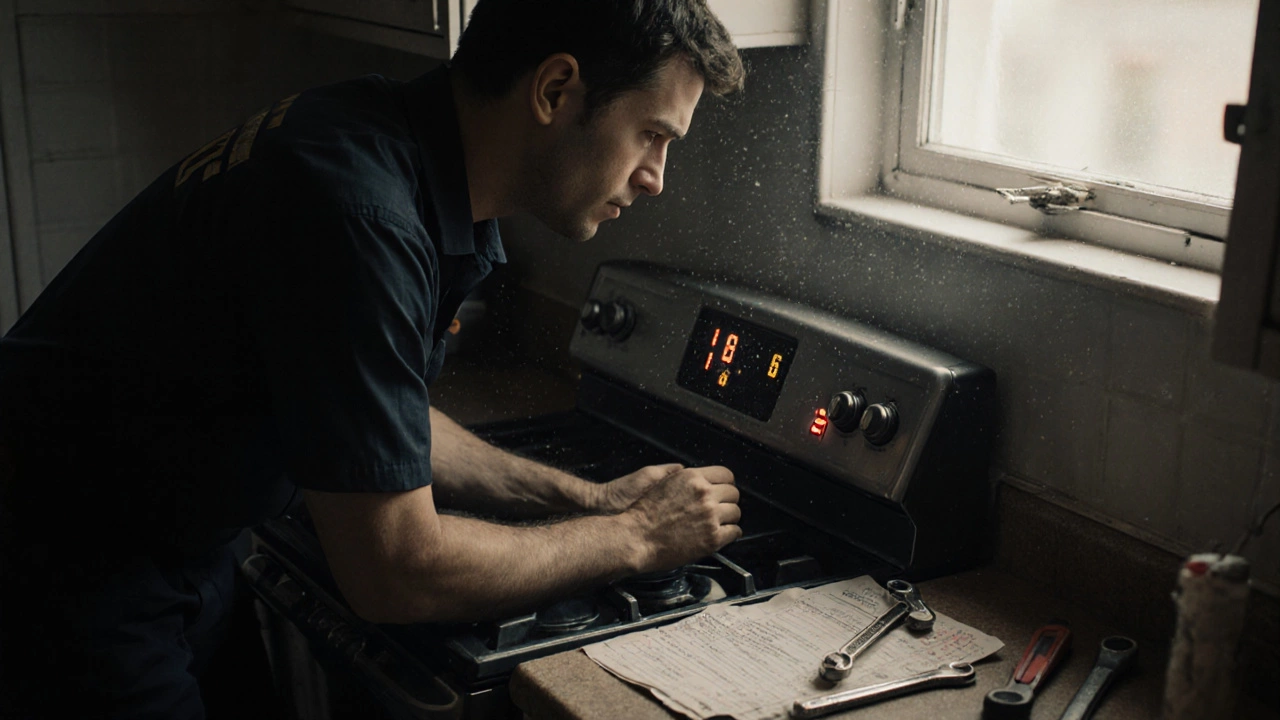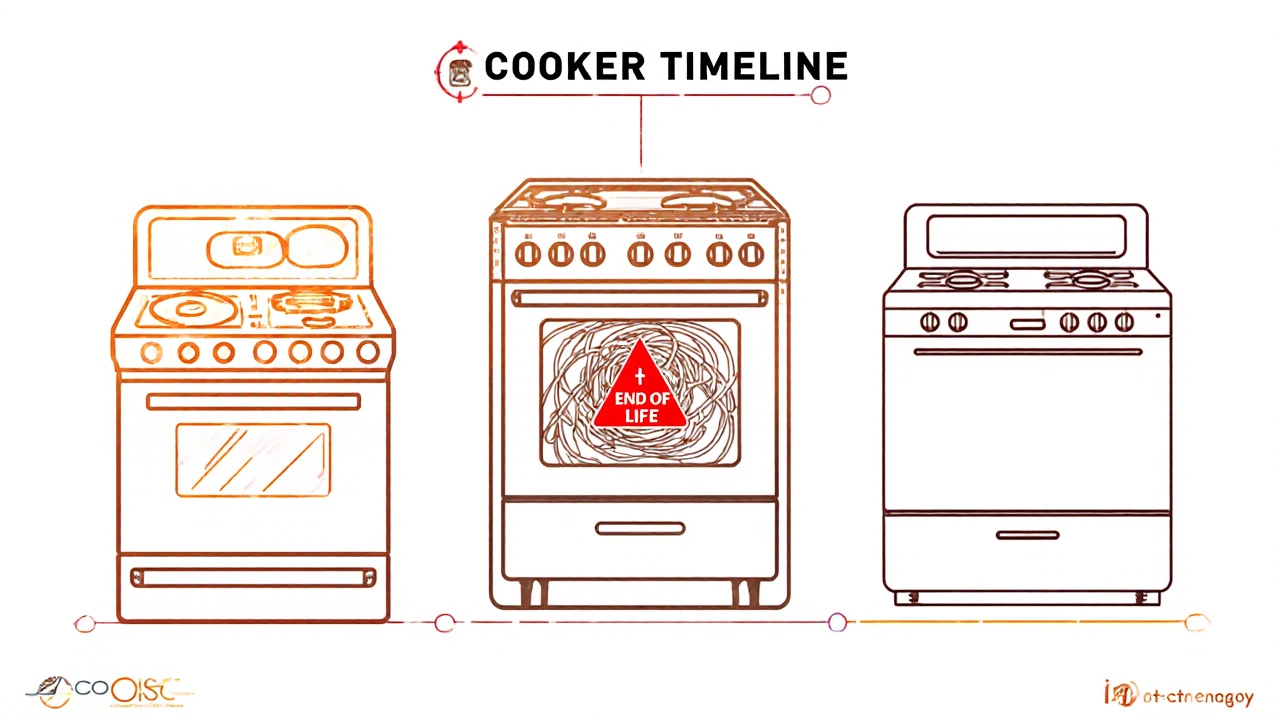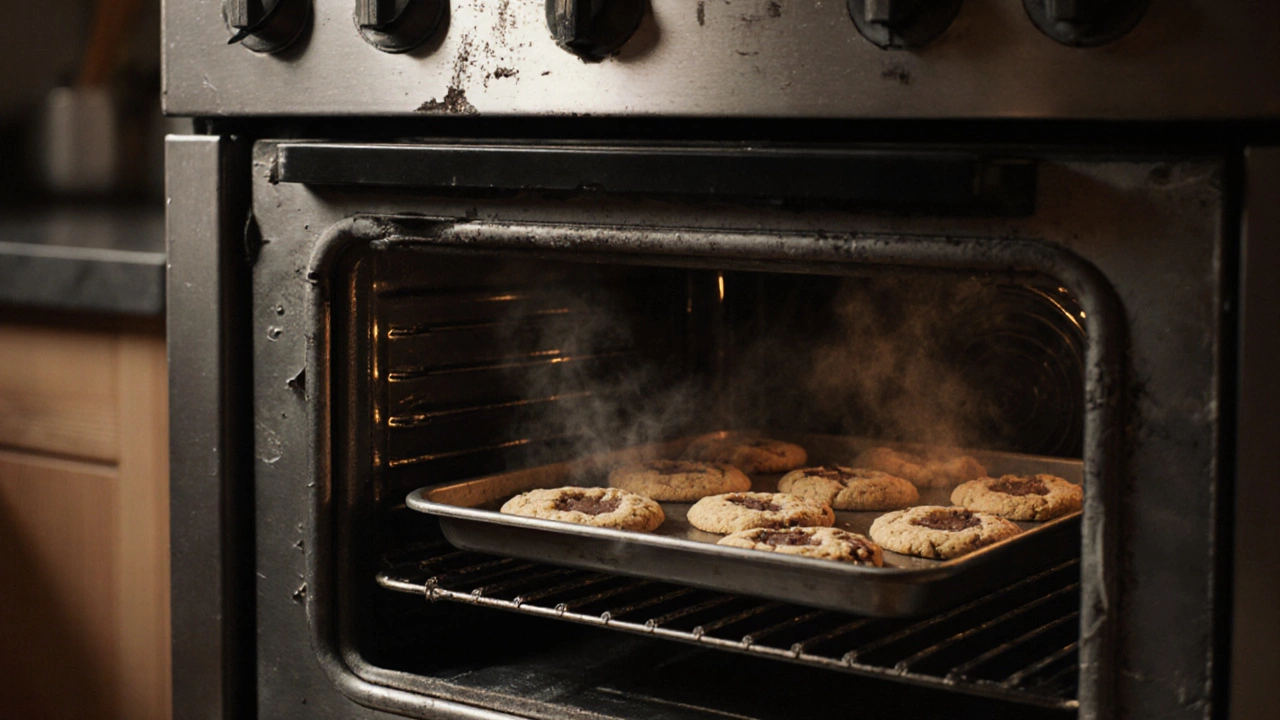Cooker Repair vs Replacement Calculator
Is it time to replace your cooker?
Enter your cooker's details to determine if repair or replacement makes the most financial sense.
Most people don’t think about how long their cooker will last until it stops working. Then suddenly, you’re staring at a broken oven, a burner that won’t light, or a control panel that’s gone dark. The question isn’t just cooker repair - it’s whether repair even makes sense anymore. So, what’s the real average life of a cooker? And how do you know when it’s time to walk away?
How Long Do Cookers Typically Last?
The average cooker lasts between 10 and 15 years. That’s the number you’ll see from most appliance manufacturers and repair professionals. But that’s just an average. Some cookers die at 7 years. Others keep going past 20. It all depends on three things: build quality, how often you use it, and how well you’ve taken care of it.
Basic electric cookers with simple controls and no fancy features often outlast high-end models. Why? Because fewer parts mean fewer things that can break. A cheap cooker with two burners and a basic oven might run for 18 years. A premium gas cooker with convection fans, self-cleaning modes, and digital touchscreens? It might start having issues after 10 or 11 years. The complexity doesn’t always mean better longevity.
Households that cook daily - three meals a day, every day - wear out their cookers faster. If you’re roasting, baking, and simmering constantly, the heating elements, thermostat, and ignition systems are under constant stress. A cooker used once a week for a roast on Sundays? That’s going to last longer than one used for dinner every night.
Signs Your Cooker Is Reaching the End of Its Life
Not every problem means it’s time to replace your cooker. But some red flags show up when the appliance is nearing its end.
- Uneven heating - Food cooks faster on one side, or the oven takes twice as long to reach temperature. This usually means the heating element is failing or the thermostat is inaccurate.
- Ignition problems - Gas cookers that click but won’t light, or take multiple tries to ignite, often have worn-out spark modules or clogged burners. If cleaning doesn’t fix it, the ignition system is likely worn out.
- Control panel glitches - Buttons that don’t respond, displays that flicker, or settings that reset on their own. Digital controls are expensive to replace, and often, the whole panel needs swapping.
- Excessive noise - Loud humming, rattling, or buzzing from the oven fan or motor. It could be a worn bearing, which is fixable - but if it’s happening alongside other issues, it’s a sign the whole unit is tired.
- High energy bills - If your cooker is taking longer to heat up and your electricity or gas bill has jumped without changing usage, it’s losing efficiency. Older units don’t insulate as well, and components lose their precision.
One of the biggest clues? When the same problem comes back after a repair. If you’ve had the same cooker repaired twice in the last year, it’s not a coincidence. It’s a pattern. You’re paying to keep an aging machine running - not fixing it.
Repair vs. Replace: When Does It Make Sense?
Here’s the hard truth: if your cooker is over 10 years old and needs a major repair, replacement is usually the smarter move.
Let’s say your gas cooker’s ignition module fails. A new module costs $80. Labor? Another $120. Total: $200. Sounds reasonable, right? But if your cooker is 12 years old, you’ve already gotten 80% of its expected life. That $200 repair is 25% of the cost of a new mid-range cooker - and you’re only buying another 2-3 years of use, maybe less.
Compare that to a new cooker. A basic electric cooker with four burners and a standard oven costs $500-$700. A gas model with similar features runs $600-$900. You’re spending $200 to get 3 more years? Or $700 to get 12-15 years of reliable performance with better efficiency, modern safety features, and a warranty?
There’s one exception: if your cooker is a high-end brand like Wolf, AGA, or Rangemaster, and it’s under 10 years old. Those are built to last, and parts are still available. Repairing them often makes financial sense. But if you’ve got a no-name brand from a discount store, and it’s older than 10 years? Don’t waste money.

What Affects Cooker Longevity?
Not all cookers are created equal. Here’s what actually makes a difference:
- Build quality - Stainless steel interiors, cast iron burners, and thicker insulation last longer than plastic housings and thin metal trays.
- Brand reputation - Brands like Bosch, Siemens, Whirlpool, and Zanussi have decades of data showing their average failure rates. They don’t cut corners on core components.
- Usage habits - Don’t slam the oven door. Don’t cook spills and leave them to bake on. Clean the oven regularly - not just the glass, but the racks and interior walls. Grease buildup stresses the heating elements.
- Electrical supply - Voltage spikes and power surges can fry control boards. If you live in an area with unstable power, consider a surge protector for your cooker.
- Professional installation - A gas cooker hooked up wrong can develop leaks or uneven gas flow, leading to premature burner wear. Always use a certified technician.
One common mistake? People think “if it’s still working, don’t touch it.” But that’s how you end up with a cooker that dies suddenly. Regular maintenance - cleaning vents, checking seals, testing burners - can add years to its life.
How to Extend Your Cooker’s Life
You don’t need to be a technician to keep your cooker running longer. Here’s what actually works:
- Wipe spills right away - Acidic foods like tomato sauce or vinegar can corrode the enamel coating inside the oven. Clean them before they bake on.
- Check door seals yearly - A loose or cracked seal lets heat escape. That makes the oven work harder and wastes energy. Test it by closing the door on a piece of paper. If you can pull it out easily, the seal needs replacing.
- Don’t use the self-cleaning function too often - The high heat (up to 900°F) stresses the heating elements and insulation. Use it once a year at most. Hand cleaning is gentler.
- Keep vents clear - If your cooker has a ventilation fan, make sure the filter is clean and the duct isn’t blocked. Dust buildup causes overheating.
- Replace worn parts early - A cracked burner cap or a frayed power cord isn’t just a nuisance - it’s a safety risk. Fix it before it causes bigger damage.
These small steps don’t cost much. But they add up. A cooker that’s cleaned and maintained properly can easily hit 15-18 years - even if it’s not a premium brand.

What to Look for in a New Cooker
If you’re replacing your cooker, don’t just buy the cheapest one on sale. Look for these features:
- At least a 2-year warranty - Anything less means the manufacturer doesn’t trust it to last.
- Easy-to-clean interior - Enamel or ceramic coatings are better than bare metal. Look for smooth, seamless surfaces.
- Separate controls for oven and hob - If the oven breaks, you should still be able to use the burners.
- Energy efficiency rating - Choose A+++ if possible. Newer models use 30-40% less energy than those made 10 years ago.
- Availability of parts - Check if the brand still sells replacement elements, thermostats, and door seals for models 5+ years old. If they don’t, you’re setting yourself up for a dead-end later.
Don’t fall for marketing buzzwords like “smart cooker” or “premium finish.” Focus on reliability. A simple, solid cooker from a trusted brand will serve you better than a flashy one with too many gadgets.
Frequently Asked Questions
Can a cooker last 20 years?
Yes, but it’s rare. Cookers that last 20 years are usually basic models with minimal electronics, used moderately, and well-maintained. High-end brands like AGA or professional-grade units are more likely to reach this milestone. Most modern cookers with digital controls are designed for 10-15 years of use.
Is it worth repairing a 12-year-old cooker?
Usually not. If the repair cost is more than half the price of a new basic cooker, it’s better to replace it. At 12 years, you’re already past the average lifespan. Even if the repair works, another part is likely to fail soon. Replacing the unit gives you better efficiency, safety, and reliability.
Do gas cookers last longer than electric ones?
Not necessarily. Gas cookers often have simpler ignition systems, but they rely on gas valves and burners that can clog or corrode. Electric cookers have heating elements that wear out over time. Both types last about the same - 10 to 15 years - if properly maintained. The real difference is in how you use them and the quality of the build.
Why do modern cookers seem to break faster than older ones?
Many modern cookers are designed with planned obsolescence in mind. They use cheaper materials, complex electronics, and integrated components that are hard to replace. Older cookers had replaceable parts and simpler designs. A 1980s cooker might have had a separate thermostat and heating element you could swap. Today, the whole control board is one unit - and if it fails, the whole cooker is often not worth fixing.
Should I replace my cooker before it breaks?
If your cooker is over 10 years old and you’re noticing signs of decline - longer heating times, uneven cooking, higher bills - it’s smart to plan ahead. Waiting until it breaks means you’ll be stuck without a cooker during holidays or busy times. Replacing it before failure gives you time to shop, compare prices, and avoid emergency repair costs.
Final Thoughts
Your cooker is one of the most used appliances in your home. It’s not just a machine - it’s part of your daily routine. But like any tool, it has a lifespan. Pushing a 15-year-old cooker beyond its limits won’t save you money. It’ll cost you in energy, time, and frustration.
Know the signs. Keep it clean. Don’t ignore small problems. And when the time comes, replace it with something built to last - not something built to be replaced.

I am an expert in the services industry with a focus on appliance repair. My passion lies in understanding how things work and educating others in simple, engaging ways. This enthusiasm fuels my writing, where I delve into topics around appliance maintenance and troubleshooting. I aim to make these subjects clear and accessible to all readers.